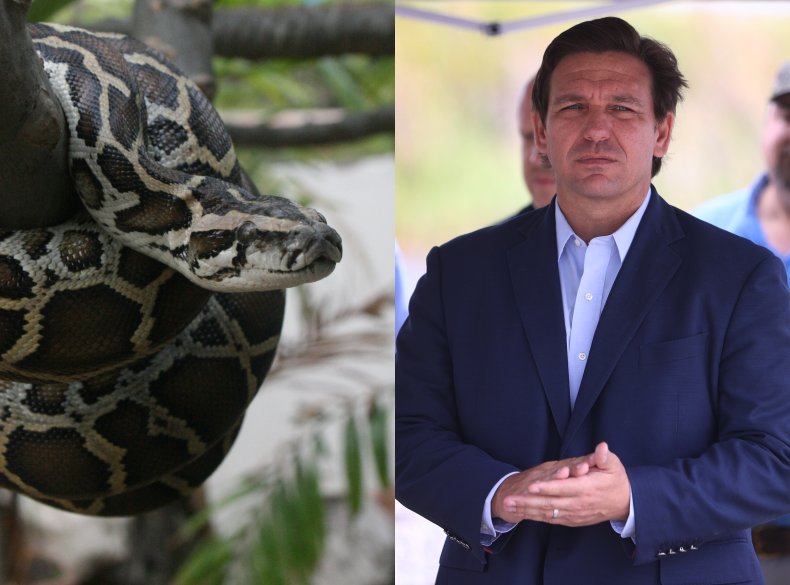Burmese Pythons Beware, Ron DeSantis Is Coming for You
Florida Governor Ron DeSantis has announced Wednesday a $3 million fund to remove Burmese pythons from the Everglades—as the invasive species expands its range northwards into the western Palm Beach County.
Burmese pythons were brought to Florida in the 1980s and 1990s as exotic pets. It is thought they gained a foothold in the Everglades after either escaping or being set free by their owners. Their spread is also thought to have been facilitated by Hurricane Andrew in 1992—the storm saw a Burmese python breeding facility destroyed, releasing hundreds of individuals into the wild.
There are now thought to be hundreds of thousands of Burmese pythons in the Everglades, and state officials have been working to control their population for decades. On November 9, the Palm Beach Post reported the first "credible" sightings in the Arthur R. Marshall Loxahatchee National Wildlife Refuge.
"We have finally, unhappily, sighted a Burmese python in the interior of the refuge," Frank Mazzotti, a wildlife professor at the University of Florida, told the newspaper.
Invasive animal biologist Mike Kirkland also said pythons are known to be in the refuge. "Once you start seeing them, that is an indication that the population is expanding," he told the Palm Beach Post. "The fact that we've had a few sightings recently leads me to believe there are more there."
The U.S. Geological Survey (USGS) says the chances of eradicating the species from Florida entirely are "very low." The species, it says, is spread over 1,000 square miles of the southern part of the state. "Controlling their numbers and preventing their spread are critical goals for South Florida land managers," it says.
In 2017, the South Florida Water Management District Governing Board introduced "aggressive action" to exterminate pythons from the Everglades by incentivizing members of the public to kill these snakes. The Python Elimination Program sought out "public-spirited individuals" to euthanize pythons for money. Agents are paid between $10 and $15 per hour, and get a $50 bonus for pythons measuring up to 4 feet, and $75 for those bigger than 4 feet. Agents can get $200 for finding a Burmese python nest.
The number of pythons caught has increased as a result of the program, with over 5,300 pythons caught in October.
In his latest environmental budget proposal, DeSantis has also targeted the removal of pythons from the Everglades. He pledged $960 million, for the 2022-23 fiscal year, for the restoration of the Everglades, $3 million of which is set aside purely for python removal.
"Governor DeSantis has been a champion for the Everglades and the environment from his first day in office," Rodney Barreto, chairman of the Florida Fish and Wildlife Conservation Commission, said in a statement. "The budget he announced [Tuesday] will significantly enhance our ability to remove even more pythons from the Everglades as we work together to conserve this natural treasure."
In his budget, the governor also pledged $175 million to improve water quality, $50 million to restore the state's springs and $35 million to combat harmful algal blooms, with $5 million of this specifically to aid local governments to clean up red tides—events that produce toxic effects on humans, fish, marine mammals, birds and fish.
"We are excited to announce this historic support for Florida's environment, Everglades restoration, and our water resources," DeSantis said in a statement. "We have seen great results so far, but we are not yet at the finish line. It's nice to see so many coming together to support these initiatives. We will be pushing hard to continue the momentum this legislative session."


